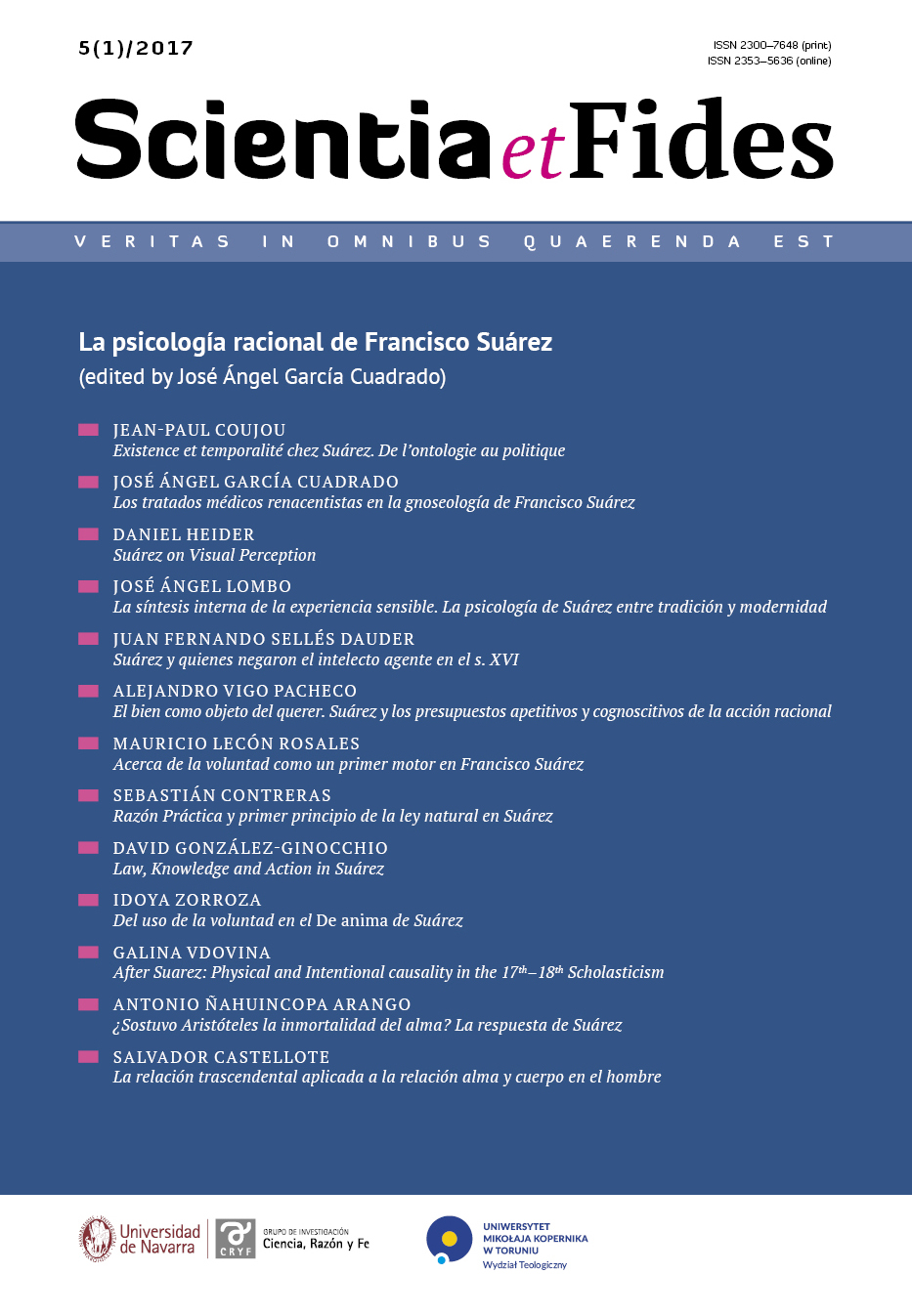La voluntad como primer motor creado en Francisco Suárez
Słowa kluczowe
freedom, actuality, potentiality, action, efficient causeAbstrakt
The will as first mover created in Francisco Suárez
The aim of this paper is to show that Francisco Suarez’s claim that the will is the prime mover of the human actions is grounded in his own metaphysical system. For that purpose, I argue that the will is not necessitated to act by any extrinsic efficient cause: nor by God’s grace, neither by the intellect, the law or fate. For all these active principles are either just a necessary condition for the will’s act or something that necessitates the practical act of the intellect by which it guides the will, but does not affects the will itself. On the other hand, I argue that Suárez’s account on potency and act allows conceiving an efficient cause that is able to determine itself. Besides Suárez distinction between the transcendental sense of potency and act and the predicamental one –among which only the latter is relevant for this matte—, for him act does not perfect potency. Then the will can simultaneously be denominated patient and agent regarding its own action since it does not imply that the will can give itself something it previously lacked.
Bibliografia
Carraud, Vincent. 2002. Causa sive ratio. La raison de la cause, de Suárez a Leibniz. París: Presses Universitaires de France.
Coujou, Jean-Paul1. 2012. “La compréhension suarézienne de la liberté de la volonté et les limites de l'héritage augustinien du libre arbitre.” 241–282. Perpignan, France: Artège.
Coujou, Jean-Paul2. 2012. “La question de l’expérience de la praxis chez Suárez.” En Droit, anthropologie & politique chez Suárez, 207–239. Perpignan, France: Artège.
Doyle, John P. 1984. “Prolegomena to a Study of Extrinsic Denomination in the Work of Francis Suárez, S.J.” Vivarium 22: 119-160.
Fernández Burillo, Santiago. 1997. “Las Disputaciones Metafísicas de Francisco Suárez S.I., su inspiración y algunas de sus líneas maestras. En el IV centenario de la primera edición (1597-1997)”. Revista Española de Filosofía Medieval 4: 65–86.
Freddoso, Alfred, trad. 1994. On Efficient Causality. Metaphysical Disputations 17, 18, 19. New Haven, Londrés: Yale University Press.
González Ayesta, Cruz. 2011. “Escotismo y tomismo en la interpretación suareciana del entendimiento como potencia.” Revista Española de Filosofía Medieval 18: 137–150.
Hellín, José S.J. 1948. “Sobre el tránsito de la potencia activa al acto según Suárez.” Razón y fe 138: 353–407.
Knuuttila, Simo. 2015. “Suárez’s Psychology.” En A Companion to Francisco Suárez, editado por Victor M. Salas and Robert L. Fastiggi, 192–220. Leiden: Brill.
Lecón, Mauricio. 2013. “Francis Suárez on the Efficiency of Substantial Forms.” The Review of Metaphysics 265: 107-124.
Lecón, Mauricio. 2016. “Metaphysics and Pscyhology of the Making of Law in Francisco Suárez.” En The Concept of Law (lex) in the Moral and Political Thought of the ‘School of Salamanca’, editado por Kirstin Bunge, Marko J. Fuchs, Danaë Simmermacher y Anselm Spindler, 249-269. Leiden: Brill.
Olivo, Gilles. 1997. “L’efficience en cause: Suárez, Descartes et la question de la causalité.” En Descartes et le Moyen Age, editado por Joël Biard and Roshdi Rashed, 91–105. París: Vrin.
Renemann, Michael. 2015. “Suárez’s Doctrine of Concepts. How Divine and Human Intellection are Interwined.” En A Companion to Francisco Suárez, editado por Victor M. Salas and Robert L. Fastiggi, 313–335. Leiden–Boston: Brill.
Schnepf, Robert. 2001. “Zum kausalen Vokabular am Vorabend der ‘wissenschaftlichen Revolution’ des 17. Jahrhunderts: Der Ursachenbegriff bei Galilei und die ‘aristotelische’ causa efficiens im System der Ursachen bei Suárez.” In Kausalität und Naturgesetz in der frühen Neuzeit, edited by Andreas Hüttemann, 15–46. Stuttgart: Studia Leibnitiana Sonderheft 31.
Suárez, Francisco. 1992. De anima (3 vols), traducido y editado por Salvador Castellote Cubells. Madrid: Sociedad de Estudios y Publicaciones.
Suárez, Francisco. 1972. De legibus. Vol. 2, traducido y editado por Luciano Pereña et al. Madrid: Consejo Superior de Investigaciones Científicas, Instituto Francisco de Vitoria.
Suárez, Francisco. 1960. Disputaciones metafísicas (7 vols), traducido y editado por Sergio Rábade Romeo et al. Madrid: Gredos.
Suárez, Francisco. 1856. “De bonitate et malitia humanorum actuum.” En Opera omnia. Vol. 4, editado por Luis Vivés. París.
Suárez, Francisco. 1856. “De voluntario et involuntario.” En Opera omnia. Vol. 4, editado por Luis Vivés. París.
Vigo, Alejandro. 2011. “Intelecto, deseo y acción según Francisco Suárez.” En Razón práctica y derecho, editado por Juan Cruz Cruz, 11–30. Pamplona: Eunsa.
Pobrania
Opublikowane
Jak cytować
Numer
Dział
Licencja
CC BY ND 4.0. Posiadaczem prawa autorskiego (Licencjodawcą) jest Autor, który na mocy umowy licencyjnej udziela nieodpłatnie prawa do eksploatacji dzieła na polach wskazanych w umowie.
- Licencjodawca udziela Licencjobiorcy licencji niewyłącznej na korzystanie z Utworu/przedmiotu prawa pokrewnego w następujących polach eksploatacji: a) utrwalanie Utworu/przedmiotu prawa pokrewnego; b) reprodukowanie (zwielokrotnienie) Utworu/przedmiotu prawa pokrewnego drukiem i techniką cyfrową (e-book, audiobook); c) wprowadzania do obrotu egzemplarzy zwielokrotnionego Utworu/przedmiotu prawa pokrewnego; d) wprowadzenie Utworu/przedmiotu prawa pokrewnego do pamięci komputera; e) rozpowszechnianie utworu w wersji elektronicznej w formule open access na licencji Creative Commons (CC BY-ND 3.0) poprzez platformę cyfrową Wydawnictwa Naukowego UMK oraz repozytorium UMK.
- Korzystanie przez Licencjobiorcę z utrwalonego Utworu ww. polach nie jest ograniczone czasowo ilościowo i terytorialnie.
- Licencjodawca udziela Licencjobiorcy licencji do Utworu/przedmiotu prawa pokrewnego nieodpłatnie na czas nieokreślony
PEŁEN TEKST UMOWY LICENCYJNEJ >>
Statystyki
Liczba wyświetleń i pobrań: 713
Liczba cytowań: 0



